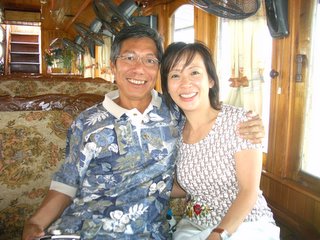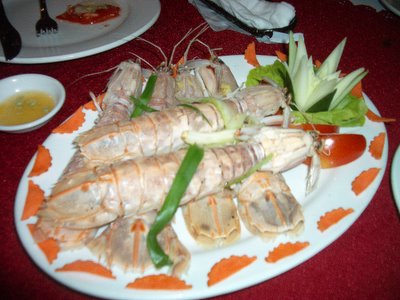Cultural Lessons Learned in Vietnam (and Elsewhere)
Doris already has posted an entry in her blog (http://www.khundoris.blogspot.com) regarding our recent trip to Hanoi, so I won’t repeat those details here. What I’ll focus on  instead are cultural lessons I’ve recently learned in Vietnam and here in Bangkok.
instead are cultural lessons I’ve recently learned in Vietnam and here in Bangkok.
While the two-day cruise aboard a junk on Vietnam’s Ha Long Bay was thoroughly enjoyable (typical scene as shown in the photo), a couple of events occurred during the cruise that reminded me just how different the typical American environment is from that here in Asia.
The setting for this first lesson learned was the dining room on board the junk. Doris and I shared all our meals with a couple, Loke and Evelyn, who are about the same age as Doris and I are and who were visiting Vietnam from Singapore. We had gotten to know them a bit during the 3-1/2 hour drive to Ha Long Bay from Hanoi, so it was only natural that we would share a booth in the boat’s dining room (as pictured).
 When our food arrived for our first meal, it was clear that the menu was going to be quite different than I expected. Doris had arranged in advance for vegetarian meals for herself, but I had decided I was going to eat whatever they put in front of me. To my surprise, almost every dish was comprised of some sort of shell fish. I recognized the prawns—not much of a shock there—although prawns in this part of the world usually are served still in their shells. Ditto for the crabs. Prying the little buggers out of their armor and removing their legs, heads, etc. was extremely messy, and Loke and Evelyn immediately recognized from my fumbling that I wasn’t used to doing this. By the time I had extracted the edible parts of the prawns and crabs, my hands looked and smelled pretty bad, so my appetite waned a bit. Then even more mysterious items began to appear. I snapped a photo of some of them—see below.
When our food arrived for our first meal, it was clear that the menu was going to be quite different than I expected. Doris had arranged in advance for vegetarian meals for herself, but I had decided I was going to eat whatever they put in front of me. To my surprise, almost every dish was comprised of some sort of shell fish. I recognized the prawns—not much of a shock there—although prawns in this part of the world usually are served still in their shells. Ditto for the crabs. Prying the little buggers out of their armor and removing their legs, heads, etc. was extremely messy, and Loke and Evelyn immediately recognized from my fumbling that I wasn’t used to doing this. By the time I had extracted the edible parts of the prawns and crabs, my hands looked and smelled pretty bad, so my appetite waned a bit. Then even more mysterious items began to appear. I snapped a photo of some of them—see below.

The pictured creatures are called mantis prawns and were about ten inches long, complete with eyes and antennae. Loke rescued me from wrestling with these things and cracked them open to expose flesh that tasted pretty much like lobster. Our dinner companions proved to be very proficient at tackling the various kinds of shell fish and absolutely loved all the food that was served. My own tastes may develop over time, but at this point in our stay here in Asia, I must say I would have preferred my seafood in a less exotic form, like in a tuna salad wrap, for example.
After dinner, we talked a lot with Loke and Evelyn and began thinking about what card games we might play. Out of the corner of my eye, I spotted something walking (not running) across the floor on the opposite side of the dining room, which was only about 10 feet away. When I looked more carefully, I saw it was a rat. I tried to remain calm and pointed out the rat to the others in our group. Doris greeted this news with a piercing scream, as did Evelyn. Doris pulled her feet up on the bench, just as Loke calmly said, “Oh, look, there are three of them.” Several members of the crew meandered over to see what the deal was, and when told about the rats, they looked mystified about why we were so freaked out. They explained that rats inevitably board boats while they are docked, often climbing aboard along the mooring ropes, and that they were just looking for food. No kidding. Doris and I were pondering what to do next when one of the rats jumped onto the bench of the booth opposite us. This produced another couple of screams from Doris, since her perch on our bench now didn’t seem quite so safe. After a few minutes of commotion, the crew managed to coax one of the rats out an open window. Unfortunately, the window was right above our cabin, so when the rat jumped down to the deck below us, we immediately could imagine it squeezing through some crack and into our room. It took us awhile to work up the courage to head to our cabin for an early turn in. Loke was the only one in our group to remain unfazed. As he explained it, “You aren’t used to rats, because you didn’t grow up poor in Singapore, like I did. Rats are a normal part of life among the poor in this part of the world. You just get used to them.” I couldn’t argue with this but told him I was just glad to be wearing tennis shoes, rather than sandals. He then began saying, in all seriousness, “It’s true, you know. Rats really do like to bite toes. Really. I’m not making this up!” Somehow Doris and I managed to put the rats out of our minds and went to bed. And we didn’t even wear our shoes while sleeping.
The third experience I had recently that drove home the point about what a different world we’re living in here crept up on me unexpectedly. I was in a bank in Bangkok, filling out a deposit slip, when I looked up to see the current date displayed on an LED sign. It was showing the present year as “2548.” A bit jarring at first. Then I remembered that Thailand, along with other countries in this region, doesn’t use the Christian calendar. Its numbering is based on the population’s Buddhist beliefs. Fortunately, Thais also accommodate the Western way of denoting time, so for example, I haven’t had to do a math problem to figure out what year I was born, in order to fill out various forms. Hopefully they understand. Either that, or they must think I’m really, really old!
 instead are cultural lessons I’ve recently learned in Vietnam and here in Bangkok.
instead are cultural lessons I’ve recently learned in Vietnam and here in Bangkok.While the two-day cruise aboard a junk on Vietnam’s Ha Long Bay was thoroughly enjoyable (typical scene as shown in the photo), a couple of events occurred during the cruise that reminded me just how different the typical American environment is from that here in Asia.
The setting for this first lesson learned was the dining room on board the junk. Doris and I shared all our meals with a couple, Loke and Evelyn, who are about the same age as Doris and I are and who were visiting Vietnam from Singapore. We had gotten to know them a bit during the 3-1/2 hour drive to Ha Long Bay from Hanoi, so it was only natural that we would share a booth in the boat’s dining room (as pictured).
 When our food arrived for our first meal, it was clear that the menu was going to be quite different than I expected. Doris had arranged in advance for vegetarian meals for herself, but I had decided I was going to eat whatever they put in front of me. To my surprise, almost every dish was comprised of some sort of shell fish. I recognized the prawns—not much of a shock there—although prawns in this part of the world usually are served still in their shells. Ditto for the crabs. Prying the little buggers out of their armor and removing their legs, heads, etc. was extremely messy, and Loke and Evelyn immediately recognized from my fumbling that I wasn’t used to doing this. By the time I had extracted the edible parts of the prawns and crabs, my hands looked and smelled pretty bad, so my appetite waned a bit. Then even more mysterious items began to appear. I snapped a photo of some of them—see below.
When our food arrived for our first meal, it was clear that the menu was going to be quite different than I expected. Doris had arranged in advance for vegetarian meals for herself, but I had decided I was going to eat whatever they put in front of me. To my surprise, almost every dish was comprised of some sort of shell fish. I recognized the prawns—not much of a shock there—although prawns in this part of the world usually are served still in their shells. Ditto for the crabs. Prying the little buggers out of their armor and removing their legs, heads, etc. was extremely messy, and Loke and Evelyn immediately recognized from my fumbling that I wasn’t used to doing this. By the time I had extracted the edible parts of the prawns and crabs, my hands looked and smelled pretty bad, so my appetite waned a bit. Then even more mysterious items began to appear. I snapped a photo of some of them—see below.
The pictured creatures are called mantis prawns and were about ten inches long, complete with eyes and antennae. Loke rescued me from wrestling with these things and cracked them open to expose flesh that tasted pretty much like lobster. Our dinner companions proved to be very proficient at tackling the various kinds of shell fish and absolutely loved all the food that was served. My own tastes may develop over time, but at this point in our stay here in Asia, I must say I would have preferred my seafood in a less exotic form, like in a tuna salad wrap, for example.
After dinner, we talked a lot with Loke and Evelyn and began thinking about what card games we might play. Out of the corner of my eye, I spotted something walking (not running) across the floor on the opposite side of the dining room, which was only about 10 feet away. When I looked more carefully, I saw it was a rat. I tried to remain calm and pointed out the rat to the others in our group. Doris greeted this news with a piercing scream, as did Evelyn. Doris pulled her feet up on the bench, just as Loke calmly said, “Oh, look, there are three of them.” Several members of the crew meandered over to see what the deal was, and when told about the rats, they looked mystified about why we were so freaked out. They explained that rats inevitably board boats while they are docked, often climbing aboard along the mooring ropes, and that they were just looking for food. No kidding. Doris and I were pondering what to do next when one of the rats jumped onto the bench of the booth opposite us. This produced another couple of screams from Doris, since her perch on our bench now didn’t seem quite so safe. After a few minutes of commotion, the crew managed to coax one of the rats out an open window. Unfortunately, the window was right above our cabin, so when the rat jumped down to the deck below us, we immediately could imagine it squeezing through some crack and into our room. It took us awhile to work up the courage to head to our cabin for an early turn in. Loke was the only one in our group to remain unfazed. As he explained it, “You aren’t used to rats, because you didn’t grow up poor in Singapore, like I did. Rats are a normal part of life among the poor in this part of the world. You just get used to them.” I couldn’t argue with this but told him I was just glad to be wearing tennis shoes, rather than sandals. He then began saying, in all seriousness, “It’s true, you know. Rats really do like to bite toes. Really. I’m not making this up!” Somehow Doris and I managed to put the rats out of our minds and went to bed. And we didn’t even wear our shoes while sleeping.
The third experience I had recently that drove home the point about what a different world we’re living in here crept up on me unexpectedly. I was in a bank in Bangkok, filling out a deposit slip, when I looked up to see the current date displayed on an LED sign. It was showing the present year as “2548.” A bit jarring at first. Then I remembered that Thailand, along with other countries in this region, doesn’t use the Christian calendar. Its numbering is based on the population’s Buddhist beliefs. Fortunately, Thais also accommodate the Western way of denoting time, so for example, I haven’t had to do a math problem to figure out what year I was born, in order to fill out various forms. Hopefully they understand. Either that, or they must think I’m really, really old!


